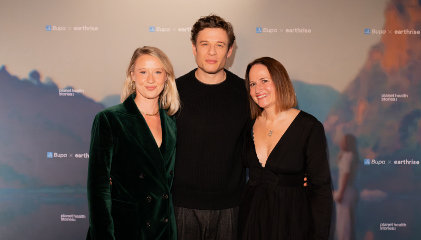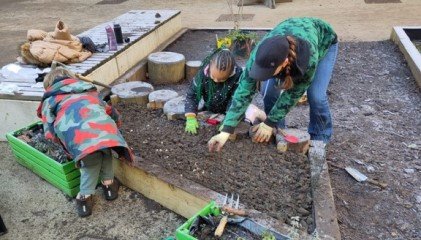
- The third year of Bupa's talent development and sustainability innovation programme, eco-Disruptive, sees six out of 18 global start-ups move one step closer to winning £200,000
- The initiative involves 115 Bupa employees working with sustainability start-ups from around the world to develop their solutions which can help tackle climate and health challenges
- Solutions include technology that aims to help tackle unnecessary landfill waste, deliver more efficient diagnosis of gynaecological conditions and address the global water shortage
Bupa, the global healthcare company, has announced six start-ups that have reached the final stage of its global talent and sustainability innovation programme, eco-Disruptive. The programme aims to find and support entrepreneurs who are pioneering solutions that can help tackle climate and health challenges.
Over 1,000 global start-ups registered interest in the programme, which were then whittled down to a cohort of 18 start-ups. The final six will now compete for the £200,000 prize1 to help further develop their sustainability solution.
The initiative involves start-ups joining forces with Bupa colleagues to further develop their idea. These will be presented to Bupa's 82,000 global workforce who will vote for the overall winner in December. The finalists have already received a mix of commercial expertise and financial support of £25,0002 to help create materials for showcasing and pitching their idea.
The shortlist of start-ups from the UK, Spain and Australia/New Zealand includes:
- DiaperRecycle (Australia), which recycles disposable nappies, ensuring new uses for the fibre and plastic, and a positive impact on the environment. Their process emits 80.6% less carbon than putting this waste in landfills.
- howz (UK), which has developed remote monitoring technology that builds a round-the-clock view of behaviour and identifies indicators that a person may need medical support.
- Medsalv (New Zealand), which is helping New Zealand hospitals re-process single-use medical devices and returning them to hospitals for safe clinical re-use.
- Mimark (Spain) which has developed a tool that aims to improve the diagnosis of gynaecological conditions including endometrial cancer. Their solution can provide a quick and highly accurate diagnosis and is less invasive.
- NovNat (UK) which has developed a technology that can generate water out of air to help address the global water shortage.
- UniSCool (Spain) which has developed cooling solutions that reduce emissions, energy consumption and extends the life of electronic devices.
As part of the initiative, the start-ups gain insights into how their product could help tackle sustainability challenges in real-life settings, including Bupa clinics and hospitals – with potential for longer-term collaboration to help Bupa deliver on its net zero by 2040 target, while ensuring customers continue to receive high quality healthcare and services. In turn, Bupa colleagues learn from the agile approach start-ups take to problem solving, and benefit from their innovative thinking to help address sustainability challenges facing our business and the planet.
For example, Bupa has established a partnership with the 2022 eco-Disruptive winner, Cassava Bags. This involves using Cassava Bag products such as 100% biodegradable bin liners and kitchen waste products along with clinical products such as headrests and tray sleeves across a number of Bupa Dental practices around Australia. In the UK, Bupa has also signed a five-year contract with SageTech Medical, a start-up from the 2022 programme, to tackle pollution from anaesthetic gases.
Iñaki Ereño, Bupa's Group CEO, said: “We've seen first-hand the power of innovation and collaboration in addressing climate challenges through our eco-Disruptive programme, with exciting solutions from previous eco-Disruptive partners already helping us make progress on our sustainability ambitions. I'm delighted to see another promising group of entrepreneurs in the programme this year who are pioneering ideas that improve people and planet health, and which could reduce the environmental footprint of our business and the wider healthcare sector.
“The climate crisis is a complex issue, and we know we can't solve it alone. Collaborating with start-ups that are passionate about this agenda strengthens our efforts to accelerate progress towards a healthier and greener future.”
The winning start-up will be announced on 12 December 2023. Read more information on the eco-Disruptive programme.
1 £200,000 or local currency equivalent
2 £25,000 or local currency equivalent
About Bupa
Bupa's purpose is helping people live longer, healthier, happier lives and making a better world. We are an international healthcare company serving over 43 million customers worldwide. With no shareholders, we reinvest profits into providing more and better healthcare for the benefit of current and future customers. We directly employ around 82,000 people, principally in the UK, Australia, Spain, Chile, Poland, New Zealand, Hong Kong SAR, Türkiye, Brazil, Mexico, the US, Middle East and Ireland. We also have associate businesses in Saudi Arabia and India.
About the eco-Disruptive programme
The eco-Disruptive programme was first launched in 2021 and is now in its third year, running across countries or regions where Bupa operates including Australia, Spain, UK, New Zealand, and Hong Kong, and invites all employees globally to follow progress and vote on the finalists.
This initiative is part of Bupa's sustainability strategy which recognises that it's not possible to look after people's health without addressing the health of the planet.
Our sustainability strategy
As a healthcare company we have an important role in addressing climate change, and a responsibility to act now. Our sustainability strategy has a clear net zero goal by 2040 underpinned by 1.5 degree aligned Science Based Targets (SBT) validated by the SBT initiative (SBTi), and an interim scope 1&2 2025 target. To set credible and ambitious targets we joined the UN-backed Race to Zero campaign, aligning our plans to tackle emissions with the Paris Agreement.



